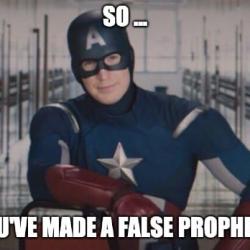On one level, I think their confusion is genuine. Moral choice is a factor, but it’s not only and entirely a matter of rejection. It’s also a matter of comprehension and incomprehension.
These are related and intertwined, each both a contributing cause and a resulting effect of the other. Our MAGA neighbors reject the things they reject, in part, because they find them bewildering and confusing. They attack “social justice” and mercy and empathy and Jubilee and diversity and equity and inclusion and humanitarian aid and disaster aid and care of any kind for other people because they find these things incomprehensible. And they are unable to comprehend these things, in part, because they choose to reject them.
So, to pick one recent example, I think John Fea and Paul Campos were both correct when they observed that Donald Trump’s remarks at the memorial service for a murdered MAGA activist constituted an explicit rejection of the core of Christianity. After watching the slain man’s widow publicly state that she had forgiven his killer and would be praying for him, Trump offered a rebuttal to that idea and attitude. “I hate my opponents,” Trump said. “I don’t want what’s best for them.”
Campos rightly calls this “sheer public apostasy” and notes that “The Trump cult is as extreme a perversion of Christianity as it’s possible to imagine, and that Donald Trump is doing at least as much to destroy Christianity in America as he is to destroy liberal democracy.”
Fea is equally blunt: “If we define the message of Christ in terms of forgiveness, love of neighbor, and love of enemy, then Trump’s words make him an anti-Christ.”

All true and accurate and fair.
But I think it’s also partly true that Trump wasn’t only rejecting these core aspects of Christianity, he was also boggling at them in genuine confusion.
The two great “love” chapters in the New Testament — 1 Corinthians 13 and 1 John 4 — are both concerned as much with epistemology as they are with ethics. Love is what we must do, but also love is how we know what is true.
“Everyone who loves has been born of God and knows God,” 1 John says. “Whoever does not love does not know God, because God is love.” Another way of putting that would be to say “Whoever rejects love cannot understand God.” Or maybe “cannot even begin to understand God.”
This combination of moral obstinacy and its accompanying bewilderment isn’t just true of Trump and MAGA’s rejection of loving enemies and of “forgive us our trespasses as we forgive those who trespass against us.” It also describes their rejection and incomprehension of what they call “social justice” — which is to say justice for other people.
They dimly grasp some aspect of justice in that they are extremely attuned to any instance in which they feel that they personally are being treated unfairly. “That’s not fair!” they’ll cry, like a small child watching another child getting a cookie when they didn’t get one. That childish cry for fairness isn’t wrong, but it’s incomplete. We all wailed like that as small children — “It’s not fair!” — when we imagined we were being excluded or denied something. But we didn’t yet understand enough about the world outside of our own selves to ever yowl that same thing when we witnessed someone else being excluded or denied something.
Everybody understands “justice” when they’re the one who didn’t get a cookie. Even Trump and his MAGA followers get that. But if some “social justice warrior” points out that someone else is being denied a cookie and says, “That’s not fair,” this confounds and confuses them. So what? That person is not me. So that’s not a matter of justice, merely of “social justice,” and that’s just some sin-of-empathy, woke-mind-virus, cultural Marxism argle bargle.
And since they cannot comprehend justice for other people, they cannot comprehend the enormous moral authority of appeals to justice and of condemnations of injustice. The power and eloquence of King or Douglass or Baldwin sounds, to them, like mere noise — sounding brass or a tinkling cymbal. They dimly grasp that this justice and injustice business seems compelling to other people in a way that threatens their grasp on power, but they cannot perceive why or how that is the case.
So they guess that it has something to do with “victimhood” and with “playing the victim card.” And then they think that perhaps they can counter this weird and confusing moral authority by “playing the victim card” themselves. They seek to usurp this moral authority by competitive displays of indignation.
This fails, of course, because the perpetrators and beneficiaries of injustice are not in any meaningful or true sense victims. And it fails because it was never about “victimhood” — it was about the moral power of justice. But, again, they are unable to understand that.
And so they mistakenly guess that their initial efforts at competitive indignation failed because their attempt to perform indignation was unconvincing. That’s probably the case — people who think empathy is a “sin” don’t tend to be good at acting — but that’s not why it failed. So they work to make their feigned indignation seem more plausible. They rehearse and rehearse and rehearse, rewriting and revising their scripts, until they are able to present a performance of “victimhood” and indignation that closely mirrors the genuine article.
When even that much-improved performance of magical victimhood fails to earn them the same moral authority wielded by those speaking for actual justice they wind up even more confused and frustrated than before.
So, yes, it’s partly that Trump and MAGA are sheer apostates and anti-Christs. But it’s also partly that they are genuinely bewildered and bereft, unable to understand the language that other people are speaking because they are unable to understand that other people are also people.












